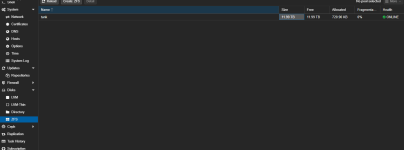I've only been homelabbing 10 months so take all of this with a grain of salt.
I'm still trying to setup my CI/CD pipeline. :/
But to answer your question, I create the ZFS after the fact. There's also some setup of the "folders" or "disks" run by a script. And then I use ansible after to create the ZFS. I haven't had time to refactor anything because I'm just trying to get a MVP for my fun little homelab.

For pxe network booting, here is my partitioning within the preseed.cfg:
Code:
#######################################################################
# 5 PARTITIONING minimal: ESP + root
#######################################################################
##### clean up any old LVM #####
d-i partman-lvm/device_remove_lvm boolean true
d-i partman-lvm/confirm boolean true
d-i partman-lvm/confirm_nooverwrite boolean true
##### force GPT #####
d-i partman-partitioning/choose_label select gpt
d-i partman-partitioning/default_label string gpt
##### explicit PV / VG / LV definition #####
d-i partman-auto/method string lvm
d-i partman-auto/disk string /dev/nvme0n1
d-i partman-auto/choose_recipe select pve-full
d-i partman-auto-lvm/new_vg_name pve
d-i partman/alignment string "optimal"
d-i partman-auto-lvm/guided_size string max
d-i partman-auto/expert_recipe string pve-full :: \
512 512 512 fat32 $primary{ } $bootable{ } method{ efi } format{ } . \
512 512 512 ext2 $primary{ } method{ format } format{ } use_filesystem{ } filesystem{ ext2 } mountpoint{ /boot } . \
8 8 -1 lvm $primary{ } method{ lvm } pv_name{ pve-pv } vg_name{ pve } . \
32768 32768 32768 ext4 $lvmok{ } in_vg{ pve } lv_name{ root } method{ format } format{ } use_filesystem{ } filesystem{ ext4 } mountpoint{ / } . \
4096 4096 4096 linux-swap $lvmok{ } in_vg{ pve } lv_name{ swap } method{ swap } format{ } . \
102400 102400 102400 ext4 $lvmok{ } in_vg{ pve } lv_name{ localdir } method{ format } format{ } use_filesystem{ } filesystem{ ext4 } mountpoint{ /var/lib/vz } . \
512 512 -2G ext4 $lvmok{ } in_vg{ pve } lv_name{ data } method{ keep } .
##### finish non-interactively #####
d-i partman/confirm_write_new_label boolean true
d-i partman/choose_partition select finish
d-i partman/confirm boolean true
d-i partman/confirm_nooverwrite boolean true
Here is the script that runs after proxmox is fully provisioned:
Bash:
#!/usr/bin/env bash
set -euo pipefail
# ─── Tunables ────────────────────────────────────────────────
readonly VG_NAME="pve"
readonly THINPOOL_NAME="data"
readonly LOCAL_DIR="/var/lib/vz"
readonly BIG_MIN_TIB=10 # first ≥10 TiB blank disk → big-storage
readonly BIG_VG="bigvg"
readonly BIG_LV="backup"
readonly BIG_MOUNT="/mnt/backup"
readonly TOKEN_ID="redacted"
readonly TOKEN_FILE="/root/.proxmox_api_token"
# ─── Helpers ─────────────────────────────────────────────────
log() { printf '\e[32m[+] %s\e[0m\n' "$*" >&2; }
warn() { printf '\e[33m[!] %s\e[0m\n' "$*" >&2; }
die() {
printf '\e[31m[x] %s\e[0m\n' "$*"
exit 1
}
run() {
log "Running: $*"
"$@"
}
[[ $EUID -eq 0 ]] || die "Must run as root"
# ─── 1. local dir store (/var/lib/vz) ────────────────────────
ensure_local_dir() {
pvesm status --storage local &>/dev/null && {
log "'local' exists – skipping"
return
}
run pvesm add dir local --path "$LOCAL_DIR" --content iso,vztmpl,snippets,backup
}
# ─── 2. make sure pve/data is a thin-pool ────────────────────
ensure_space_for_metadata() {
local need=32 free
free=$(vgs --noheadings -o vg_free_count "$VG_NAME" | tr -d ' ')
while ((free < need)); do
run lvresize -y -L-256M "/dev/${VG_NAME}/${THINPOOL_NAME}"
free=$(vgs --noheadings -o vg_free_count "$VG_NAME" | tr -d ' ')
done
}
ensure_thinpool() {
lvs --noheadings "${VG_NAME}/${THINPOOL_NAME}" &>/dev/null || {
warn "data LV missing"
return
}
if lvs --noheadings -o lv_attr "${VG_NAME}/${THINPOOL_NAME}" | grep -q '^[[:space:]]*t'; then
log "Thin-pool already present – skipping conversion"
return
fi
log "Converting ${VG_NAME}/${THINPOOL_NAME} to thin-pool"
umount -q "/dev/${VG_NAME}/${THINPOOL_NAME}" 2>/dev/null || true
wipefs -af "/dev/${VG_NAME}/${THINPOOL_NAME}" 2>/dev/null || true
ensure_space_for_metadata
run lvconvert -y --type thin-pool "/dev/${VG_NAME}/${THINPOOL_NAME}"
}
# ─── 3. register local-lvm storage in Proxmox ────────────────
ensure_local_lvm() {
if pvesm status --storage local-lvm &>/dev/null; then
pvesm set local-lvm --vgname "$VG_NAME" --thinpool "$THINPOOL_NAME" --content rootdir,images || warn "pvesm set failed"
else
run pvesm add lvmthin local-lvm --vgname "$VG_NAME" --thinpool "$THINPOOL_NAME" --content rootdir,images
fi
}
# ─── 4. automatically create big-storage if a blank ≥10 TiB disk exists ──
ensure_big_storage() {
# skip if bigvg already present
vgdisplay "$BIG_VG" &>/dev/null && {
log "bigvg already exists – keeping"
return
}
local disk=''
while read -r size name; do
blkid -p "/dev/$name" &>/dev/null && continue # has signature
((size / 1024 / 1024 / 1024 / 1024 >= BIG_MIN_TIB)) && {
disk="/dev/$name"
break
}
done < <(lsblk -dnbo SIZE,NAME)
[[ -z $disk ]] && {
log "No blank ≥${BIG_MIN_TIB} TiB disk found – skipping"
return
}
log "Creating big-storage on $disk"
run pvcreate "$disk"
run vgcreate "$BIG_VG" "$disk"
run lvcreate -n "$BIG_LV" -l 100%FREE "$BIG_VG"
run mkfs.ext4 -F "/dev/${BIG_VG}/${BIG_LV}"
mkdir -p "$BIG_MOUNT"
echo "/dev/${BIG_VG}/${BIG_LV} $BIG_MOUNT ext4 defaults 0 2" >>/etc/fstab
mount "$BIG_MOUNT"
}
Here is the ansible code that creates the ZFS:
YAML:
---
- name: Ensure ZFS utilities are installed
apt:
name: zfsutils-linux
state: present
update_cache: yes
- name: Check if ZFS pool exists
command: zpool list -H -o name
register: zfs_pools
changed_when: false
- name: Create ZFS pool if not present
command: zpool create -f tank /dev/sda
when: "'tank' not in zfs_pools.stdout_lines"
- name: Check if ZFS dataset exists
shell: zfs list -H -o name tank/media
register: zfs_dataset_check
failed_when: false
changed_when: false
- name: Create a ZFS dataset for media
command: zfs create tank/media
when: "'tank/media' not in zfs_dataset_check.stdout_lines"
- name: Check if ZFS dataset is mounted
shell: zfs get -H -o value mounted tank/media
register: zfs_mount_status
changed_when: false
failed_when: false
- name: Ensure ZFS dataset is mounted
command: zfs mount tank/media
when: zfs_mount_status.stdout != "yes"
- name: Create directory if ZFS mount is missing
file:
path: /tank/media
state: directory
mode: '0755'
when: "'/tank/media' not in zfs_mount_status.stdout"
- name: Ensure media directories exist in ZFS dataset
file:
path: '/tank/media/{{ item }}'
state: directory
mode: '0755'
with_items:
- movies
- shows
I do not know if this "works" in the sense that I haven't done extensive testing. It's 100% a ZFS pool and I can put data into it and access it from other machines using NFS. I haven't tried more complicated ZFS stuff like raid. I'm planning on just mirroring ZFS for Prod and Dev and trying to keep things "simple".
View attachment 88592


